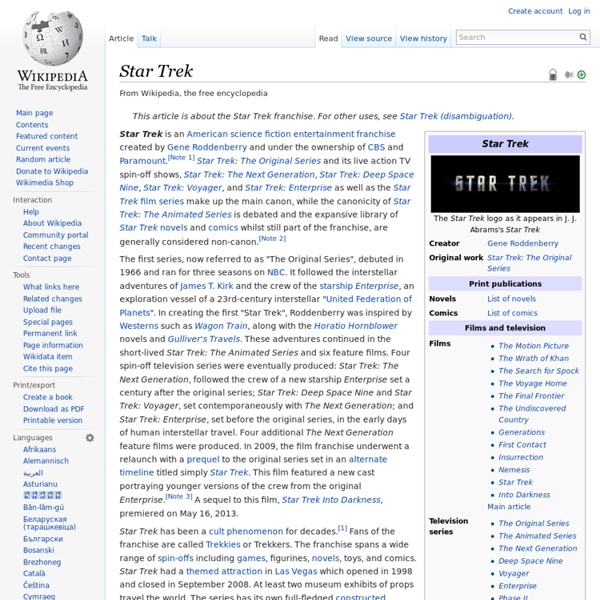Main Page - Obsidian Fleet Database
TOS
The show is set in the Milky Way galaxy, roughly during the 2260s. The ship and crew are led by Captain James T. Kirk (William Shatner), first officer and science officer Mr. Spock (Leonard Nimoy), and chief medical officer Leonard McCoy (DeForest Kelley). Space: the final frontier. The series was produced 1966–67 by Desilu Productions, and by Paramount Television 1968–69. Creation and development[edit] In 1964, Gene Roddenberry, a longtime fan of science fiction, drafted a proposal for a science-fiction television series that he called Star Trek. Some of the influences on his idea that Roddenberry noted included A. The second pilot introduced the rest of the main characters: Captain Kirk (William Shatner), chief engineer Lt. Production[edit] The original starship Enterprise The show's production staff included art director Matt Jefferies. Season 1 (1966–67)[edit] William Shatner as Kirk in action, from the episode "Where No Man Has Gone Before", 1966 Season 2 (1967–68)[edit] Look! and
TrekMovie.com | the source for Star Trek news and information
Reviews
A review is an evaluation of a publication, product, service, or company such as a movie (a movie review), video game, musical composition (music review of a composition or recording), book (book review); a piece of hardware like a car, home appliance, or computer; or an event or performance, such as a live music concert, play, musical theater show, or dance show. In addition to a critical evaluation, the review's author may assign the work a rating to indicate its relative merit. More loosely, an author may review current events, trends, or items in the news. A compilation of reviews may itself be called a review. In the scientific literature, review articles are a category of scientific paper, which provides a synthesis of research on a topic at that moment in time. Book review[edit] A book review (or book report) is a form of literary criticism in which a book is analyzed based on content, style, and merit. Music reviews[edit] Performance reviews[edit] Recording reviews[edit]
Majel Barrett
Majel Barrett-Roddenberry (first name pronounced /ˈmeɪdʒəl/; born Majel Leigh Hudec;[1] February 23, 1932 – December 18, 2008) was an American actress and producer. She is best known for her role as Nurse Christine Chapel in the original Star Trek series, Lwaxana Troi on Star Trek: The Next Generation and Star Trek: Deep Space Nine, and for being the voice of most onboard computer interfaces throughout the series. She was also the wife of Star Trek creator Gene Roddenberry. As the wife of Roddenberry and given her ongoing relationship with Star Trek—participating in some way in every series during her lifetime—she was sometimes referred to as "the First Lady of Star Trek". Biography[edit] Star Trek[edit] Barrett as the original "Number One" in Star Trek: The Original Series first pilot episode Barrett and her husband, Gene Roddenberry, were honored in 2002 by the Space Foundation with the Douglas S. Other roles[edit] The voice in the railroads[edit] Final voiceover work[edit] Death[edit]
ENT
Star Trek: Enterprise (originally titled Enterprise for the first two seasons) is a science fiction TV series and a prequel to the original Star Trek. The series premiered September 26, 2001 on the UPN television network with the final episode airing on May 13, 2005.[1] Production[edit] In May 2000, Rick Berman, executive producer of Star Trek: Voyager, revealed that a new series would premiere following the final season of Voyager.[3] Little news was forthcoming for months as Berman and Brannon Braga developed the untitled series, known only as "Series V", until February 2001, when Paramount signed Herman Zimmerman and John Eaves to production design Series V.[4] Within a month, scenic designer Michael Okuda, another long-time Trek veteran, was also signed.[5] Michael Westmore, make-up designer for Trek since Star Trek: The Next Generation (TNG), was announced as working on Series V by the end of April.[6] Returning as director of photography would be Marvin V. Cast of characters[edit]
Timeline
Series and movie settings[edit] This table shows each TV series and movie, its year of release or broadcast, the year it was set in, according to the prevailing Okuda chronology (see below) and the stardate range for that year. The designation Enterprise-based series are the series that featured the various incarnations of the starship USS Enterprise. In universe timeline chronological order Star Trek Enterprise (ENT), Star Trek: The Original Series (TOS), Star Trek: The Animated Series (TAS), Star Trek: The Next Generation (TNG) and all 12 of the Star Trek feature films including the two newest J.J. Abrams alternate reality films based on the original series. Timeline[edit] This timeline is based on the Star Trek Chronology model described below, supplemented by data from startrek.com.[5] Note: Many of these dates are rounded-off approximations, as the dialog from which they are derived often includes qualifiers such as "over," "more than," or "less than." 1st millennium[edit]
Ex Astris Scientia
List of Star Trek: Enterprise episodes
Series overview[edit] Episodes[edit] Abbreviations: Season 1 (2001–02)[edit] "Broken Bow" aired as a two-hour episode on UPN. Season 2 (2002–03)[edit] Season 3 (2003–04)[edit] Season 4 (2004–05)[edit] Story arcs[edit] Star Trek: Enterprise relied upon story arcs more often than previous Star Trek series, with the exception of Deep Space Nine. The first two seasons had only two story arcs which re-emerged sporadically, while the entire third season was a single arc that also included episodes from the second and fourth seasons. See also[edit] References[edit]



